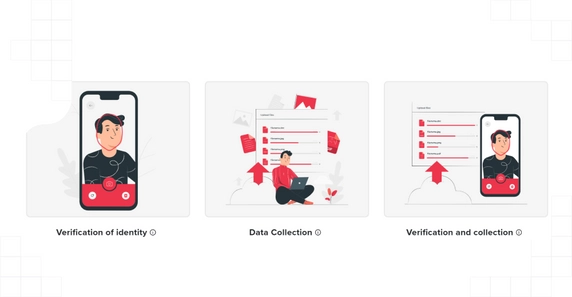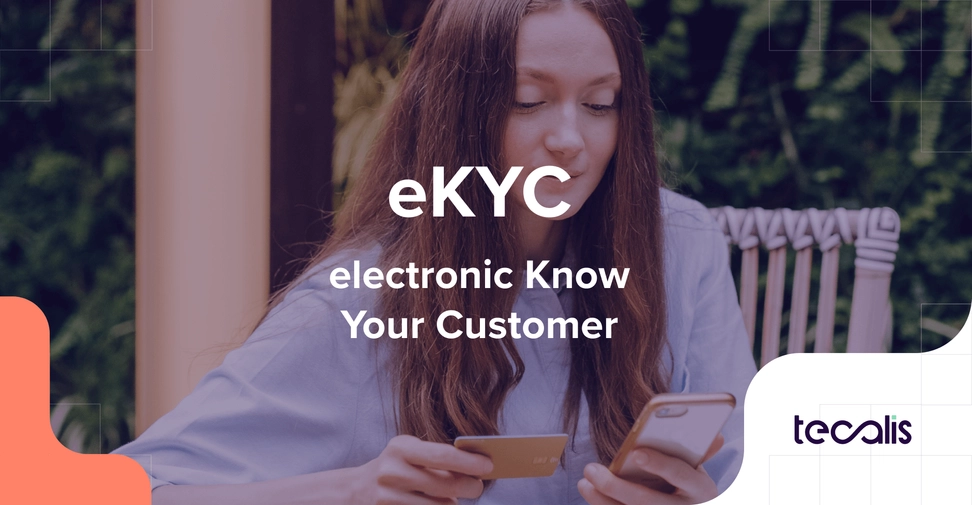Index
Get the latest news right in your inbox
The birth of the eKYC (electronic Know Your Customer) term is due to the transformation of certain key processes in industries that need to verify the identity of their customers and users with more stringent controls than usual.
Although the word eKYC has been adopted recently and is still spreading, the term used to refer to the well-known KYC (Know Your Customer) process has been used for a longer time by professionals in the concerned areas.
In this article, we unpack the keys to the transformation of Know Your Customer, and how it has evolved into the current and most recent electronic Know Your Customer.
KYC: Customer identification
As we have been anticipating, the KYC (Know Your Customer) process is the predecessor of the innovative eKYC. This process includes a series of controls associated with the identification of new customers and users during the digital onboarding phase.
Learn in this article all the details of the Know Your Customer (KYC) process in depth.
The financial, banking, investment services, insurance and other related industries were the first to coin the KYC concept. Due to the sensitiveness of the operations carried out by them and their clients, and given the nature of these operations, it is not only essential but also a legal requirement to reliably verify the identity of their users.
While identity verification is a practice that applies to each and every company and organization regardless of their area of activity, performing this task with more exhaustive and very specific controls is something that is regulated and to which companies in the aforementioned industries are legally obliged.
Digitalization: What is eKYC (electronic Know Your Customer)?
The electronic Know Your Customer eKYC is the transposition of the KYC process to the digital and online plane. The financial sector and its related industries are the digital pioneers. The digital transformation took place much earlier in these sectors of activity than in others that are still anchored in semi-digitalized models.
In this way, we can define eKYC as a set of digitized user and customer identity verification controls. In contrast to its predecessor, it converts the entire process into paperless, is capable of making it remoted and automating with intelligent bots tasks that were previously carried out by human agents.
Types of eKYC

We can define three types of eKYC according to their implementation:
- Assisted: Here, an agent performs the KYC checks himself, but with the help of digitized systems to collect, verify and store the identity document. The verification and cross-checking between the face on the document and that of the physical person are done by the human agent, and he is the one who attests that the customer is who he claims to be.
- Semi-Assisted: This model is based on the implementation of the eKYC process in physical locations but autonomously by the customer. The user performs the entire process in a commercial location where there are agents who can help him, but it is he who interacts with a digital system on an electronic device. We can also speak of a semi-assisted eKYC system in relation to videoconferencing models, which now allow the process to be done remotely.
- Unassisted: This is the method that we closely associate with the term electronic Know Your Customer. We would be talking about an online eKYC system executable on any electronic device with Internet access and without the remote or face-to-face intervention of a human agent. The user would do it by himself with the help of on-screen instructions.
How does identity verification work in the eKYC process?

The identity verification process in eKYC is not too different for the user than in conventional KYC processes. Apart from the time and paperwork benefits, the process is the same except that in eKYC these checks are carried out by an automated system rather than by a human agent.
The user can perform an eKYC online from their own device, guided by a simple and convenient interface (with voiceovers in certain solutions) that completes the process in less than 3 minutes. Digital identity verification can be performed in a number of ways, but not all of them comply with the most demanding technical and regulatory standards and requirements.
Phases of eKYC
Biometric video identification is the safest and most secure method to verify identity in an eKYC process in any market and industry and works as follows:
- The user registers his data on the platform.
- You are asked to show your ID card to the camera from the front and back.
- Artificial intelligence extracts data from the document and checks its veracity and integrity.
- The user is asked to show his or her face and perform an action as proof of life.
- The automated system extracts a biometric facial pattern from the customer to identify him/her, generate a user in the system and cross-reference the data with those contained in the identity document.
- The system generates credentials to give the user access to the system and to the products and services subsequently contracted through facial biometric authentication.
For this series of steps in the eKYC process, it is essential to consider the user experience and the interface in which they will take place. Only the most polished identity verification solutions for online eKYC processes are able to avoid mid-process abandonment and ensure high conversion rates.
eKYC, AML, and the FinTech industry
Anti-Money Laundering (AML) is a major concern for companies in the banking, financial and related sectors. Establishing AML strategies is necessary, as there are many regulations that oblige companies to establish these controls.
KYC is a crucial process within AML (Anti-Money Laundering) policies and controls and is capable of addressing many of the risks associated with companies in these sectors. Identity fraud and identity theft attacks are a pressing need for trading platforms, cryptos, online insurers and any FinTech company.
The eKYC, on the other hand, is making it possible to automate compliance with legislation with digitized Anti-Fraud Control and Risk Management Systems integrated into the onboarding process of new clients. Additionally, not only in the onboarding but also later in the authentication and contracting processes, systems derived from those used in eKYC can be established to mitigate any type of fraud attempt.
Why digitize the KYC process
The increase in demand for digitized products and services has led companies to focus their efforts on reaching markets beyond their natural borders. Scalability is one of the key objectives of businesses in the medium term, taking advantage of their value proposition and the possibilities of digital systems to operate easily anywhere in the world.
In this sense, eKYC, which responds to standards that have been implemented in most states, is capable, if done properly and adapted to each market, of allowing companies to incorporate users and customers in any jurisdiction with full legal guarantees.
On the other hand, productivity and efficiency are of the utmost importance for any organization. The eKYC boosts ratios to previously unattainable heights thanks to error-free systems that allow employees to focus on more important tasks, leaving bureaucracy aside.
























